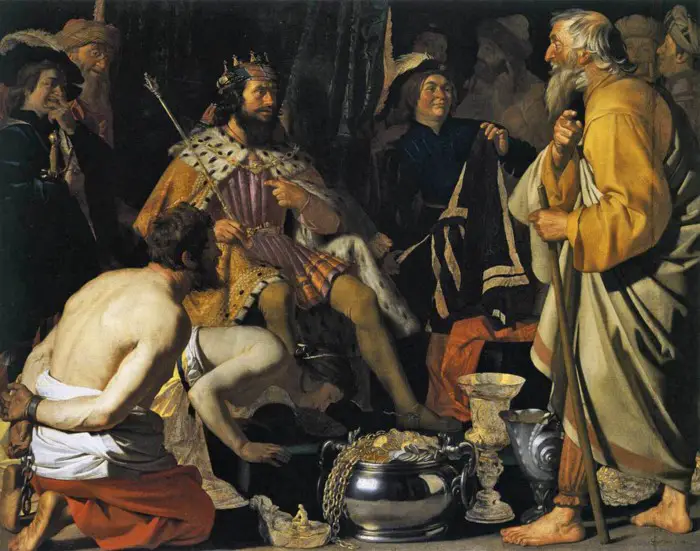 ing Kroisos of Lydia, son of Alyattes, was a king of the ancient kingdom of Lydia in Asia Minor who ruled during c. 560 — c. 546 BC. He is considered to be the wealthiest man to have ever lived on this earth, this is according to an ancient historian by the name of Herodotos of Halikarnassos who lived from c.484 to c.425 BC. In his book (The Histories of Herodotos of Halikarnassos) he portrays Kroisos as an unimaginably wealthy and powerful ruler. Herodotos states that Kroisos had numerous treasuries overflowing with gold and other treasures which he proudly displayed to the Athenian lawgiver Solon.
ing Kroisos of Lydia, son of Alyattes, was a king of the ancient kingdom of Lydia in Asia Minor who ruled during c. 560 — c. 546 BC. He is considered to be the wealthiest man to have ever lived on this earth, this is according to an ancient historian by the name of Herodotos of Halikarnassos who lived from c.484 to c.425 BC. In his book (The Histories of Herodotos of Halikarnassos) he portrays Kroisos as an unimaginably wealthy and powerful ruler. Herodotos states that Kroisos had numerous treasuries overflowing with gold and other treasures which he proudly displayed to the Athenian lawgiver Solon.
Wealth beyond measure
As this is a very old era we are talking about, there is no hard evidence of wealth or other statements apart from Herodotos. But he seems to portray Kroisos as having enough wealth to buy everything on earth (at that period in time). Throughout history, there have been left physical signs of Kroisos’s unimaginable wealth such as the first Temple of Artemis at Ephesos. This is justified by a marble column from the temple engraved with the word “King Kroisos dedicated this” in greek. The column can be found in the British Museum of history.
It has also been stated throughout history that Kroisos was also the king to mint gold coins. This was seen by contemporaries at the time as an extravagant display of wealth. Interestingly enough, these were one of the first if not the first gold coins to be used as currency in ancient history. You may also ask yourself the amount of land that such a wealthy and powerful man possessed at the time. He actually ruled almost all of western Anatolia, some historians argue that this was the largest empire in the sixth century BC.
Wealth comes in different forms
Kroisos may have been the wealthiest and most powerful king to ever live, however, sometimes wealth can be measured in different ways. Some historians believe that Solon was the greatest philosopher to have ever lived and he was a statesman as well as Kroisos’s advisor. One day Kroisos asked Solon who was the happiest man to have ever lived, the king expected Solon to say that he was because he was the richest and most powerful man on earth, but Solon had an unexpected answer.
Solon responded with the name Tellos, an Athenian peasant. Solon explained to Kroisos that happiness is not measured in wealth or power, a poor man such as Tellos is content with what he has and he may be happier than the wealthiest man on earth. What has been truly philosophical of Solon is him mentioning that no person is truly happy until they are dead because at any moment in time while they are still alive, the uttermost misfortune may yet befall on them.
After a while, Kroisos lived a series of terrible tragedies himself. He lost his son Atys and his army was defeated in the Battle of Thymbra by Shah-in-Shah Kurush II of the Persian Achaemenid Empire, named Cyrus the Great. Cyrus captured Kroisos and planned to burn him alive before the fire was set Kroisos Solon in desperation. Cyrus puzzled, asked Kroisos to explain who is he calling for. Kroisos then explained that Solon was the wisest man he had ever met, for he had warned him that wealth was no safeguard against misfortune. Cyrus, who was wiser than Kroisos had been, listened to this warning and decided not only to let Kroisos live but also to make him one of his advisors.
Wealth within one’s knowledge
Solon’s philosophical explanation is a justification to the question “does money bring happiness?” as wealth can only purchase temporary happiness. You learn to live a happy life, you don’t pay for a happy life. As he states, true happiness can never be achieved as long as there is a negative factor that can destroy that happiness. This is why in life, we only live certain moments of happiness and the wealthiest people are those that have the most amount of those happy moments in life.
Kroisos became the wealthiest man the moment he realized that his monetary wealth did no make his life happier, it was just a means of portraying his egoistic side, this is another perspective to see that happiness cannot be lived in selfishness, in order for happiness to occur it has to be experienced with at least another person. So in theory, Kroisos was truly the wealthiest man to walk on this earth as by the end of his life he understood both monetary wealth as well as spiritual wealth.
Avid Writer with invaluable knowledge of Humanity!
Upcoming historian with over 30 million views online.
“You make your own life.”





